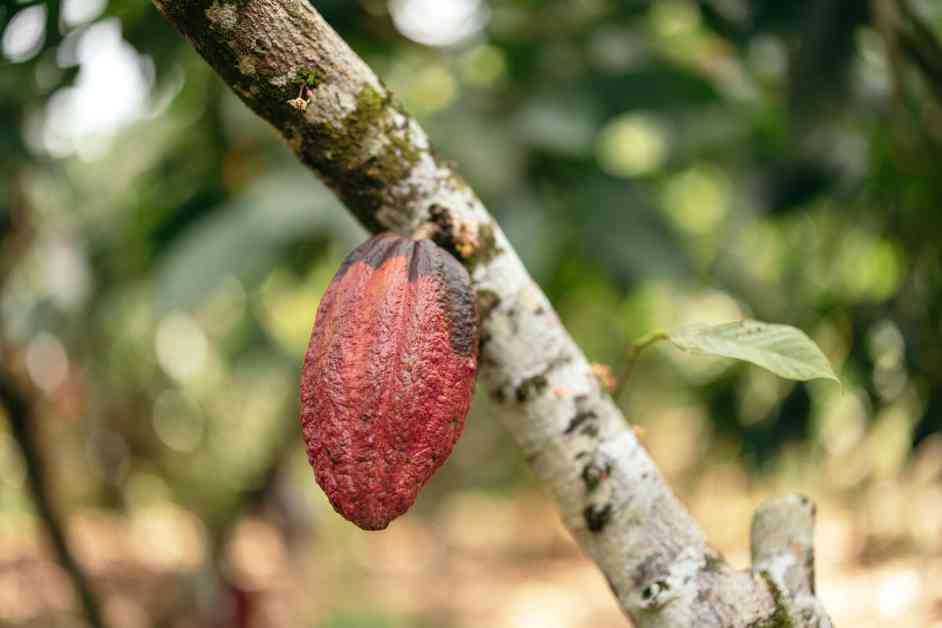The rising temperatures of our planet are not just causing heatwaves and melting ice caps – they are also impacting one of the world’s most beloved treats, chocolate. Recent research has unveiled the harsh reality facing cocoa production in West African countries, which supply the majority of the world’s chocolate. This phenomenon has led to a fourfold increase in cocoa prices over the past two years, turning Valentine’s Day celebrations into a pricier affair for chocolate lovers worldwide.
The Culprit: Climate Change’s Toll on Cocoa Production
A study conducted by charity Christian Aid and nonprofit news organization Climate Central has shed light on the detrimental effects of climate change on cocoa production. The research revealed that extreme temperatures and erratic rainfall patterns in West African nations, including Côte d’Ivoire, Ghana, Cameroon, and Nigeria, are significantly impacting cacao trees. These trees, essential for chocolate production, thrive in a temperature range of 18–32 degrees Celsius, making them vulnerable to the increasing heatwaves caused by climate change.
Kristina Dahl, the vice president for science at Climate Central, emphasized the urgent need for consumers to consider the broader implications of climate change on their favorite indulgences. She highlighted the direct consequences of rising temperatures on farmers and communities who depend on cacao production for their livelihoods, urging a shift in perspective when enjoying Valentine’s Day chocolates.
The Escalating Impact of High Heat
An analysis of temperature data over the past decade revealed a concerning trend: climate change has extended the duration of high temperatures in cocoa-producing regions. In 2024 alone, an additional six weeks of high temperatures above 32 degrees Celsius were recorded during the main cocoa crop season. This prolonged exposure to extreme heat has led to a reduction in the quality and quantity of cocoa harvests, culminating in record-high cocoa prices in late December 2024.
The Struggle for Adaptation and Fair Compensation
The changing climate has posed significant challenges for cocoa farmers in West Africa, who are struggling to adapt to the shifting growing conditions. As temperatures soar and rainfall becomes unpredictable, farmers are faced with dwindling yields and degraded crop quality. Moreover, the lack of financial support and fair compensation further compounds the difficulties faced by these farmers, who receive only a fraction of the price paid for a chocolate bar.
Calls for Change and Sustainable Practices
Industry experts and farmer associations have called for urgent action to support cocoa farmers and ensure the sustainability of chocolate production. Ibrahima Coulibaly, president of ROPPA, emphasized the need for governments to invest in farmers and their organizations, providing fair prices for cocoa and enabling the adoption of nature-friendly practices. These practices, such as planting shade trees to protect cocoa pods from heat and sunlight, are essential for adapting to the changing climate and safeguarding chocolate supplies.
The Path to a Greener Cocoa Industry
To mitigate the impact of climate change on cocoa production, a shift towards sustainable agriculture practices is imperative. Current incentives, such as subsidies for chemical fertilizers and mono-cropping practices, have contributed to deforestation and environmental degradation in cocoa-producing regions. The Rainforest Alliance advocates for taxing harmful practices and promoting soil-friendly techniques that preserve biodiversity and soil health.
Looking Ahead: A Call for Global Action
As chocolate remains a cherished treat enjoyed by millions worldwide, the future of cocoa production hinges on collective efforts to combat climate change. Osai Ojigho, director of policy and public campaigns at Christian Aid, underscores the importance of curbing global greenhouse gas emissions to protect cocoa production and ensure the affordability of chocolate for all. By prioritizing sustainable practices and equitable compensation for farmers, we can safeguard the future of chocolate and support the livelihoods of those who bring this sweet delight to our tables.














